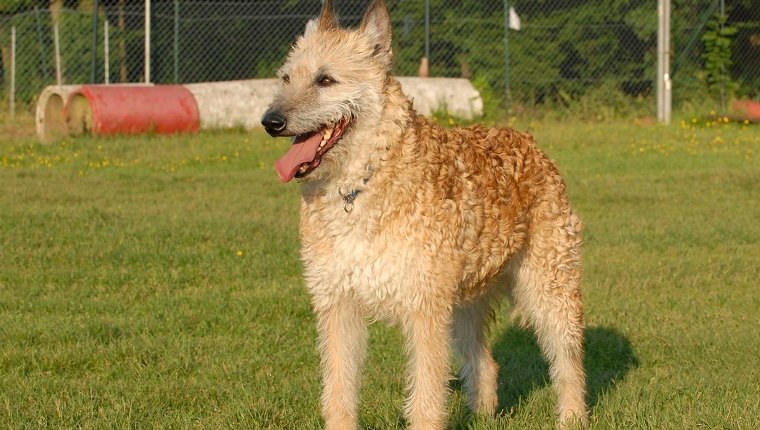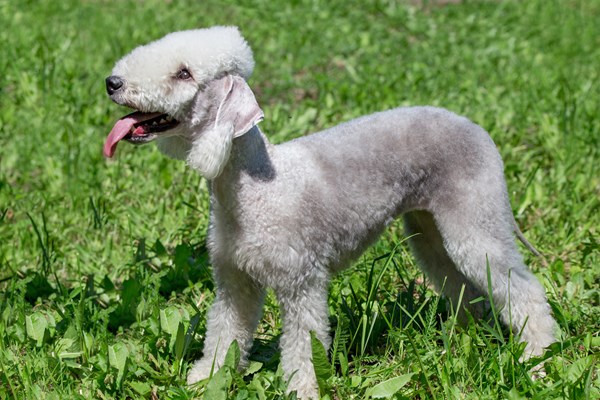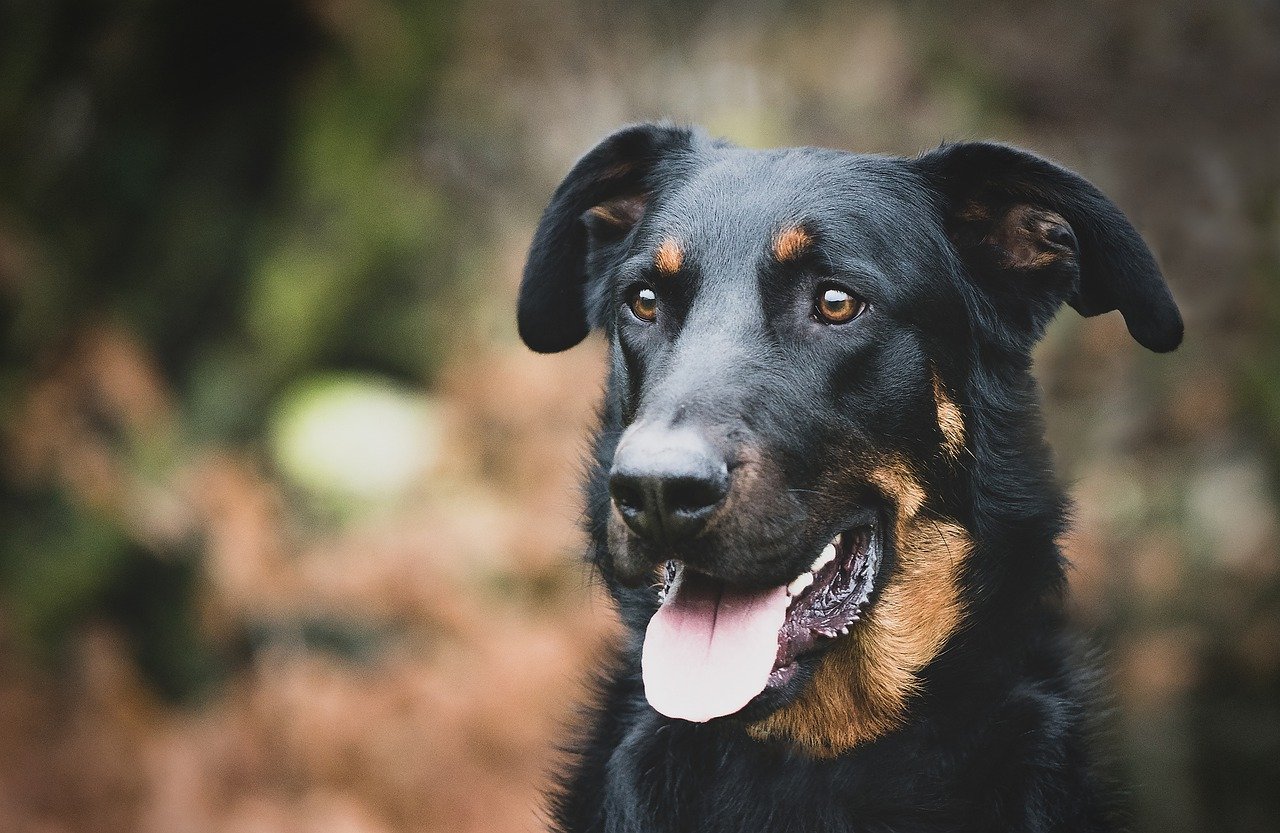Brazilian Terrier Dog Overview
The Brazilian Terrier, or Fox Paulistinha, is a reasonably tall terrier with short fur and appealing flop-forward ears.
They are lively and playful, extremely intelligent, and always up for a run.
Affectionate for their family, they are content to sit with you in quiet companionship throughout the evening once they have depleted their day energy intake.
They were developed in Brazil and are now a popular family pet there, where they are renowned for their ability to catch and kill bothersome rodents in homes and on fields.
They are a crossbreed of numerous current breeds and are exceptionally hardy, living long into their teens.
Brazilian Terrier Highlights
- Once they get to know you they understand the ground rules. These dogs are an excellent companion choice for senior citizens living alone as well as for families.
- They are barkers, particularly when they’re bored.
- They are extremely smart and can be stubborn. So firmness and consistency must be important parts of any training regimen.
- They have short, wiry-haired coats, which means their grooming can easily be accomplished at home.
Brazilian Terrier Breed Features & Ratings:
Rated base on a 5 Star Scale
ENERGY LEVEL: 4 Star
EXERCISE REQUIREMENTS: 4 Star
PLAYFULNESS: 5 Star
AFFECTION LEVEL: 5 Star
FRIENDLINESS TO DOGS: 5 Star
FRIENDLINESS TO OTHER PETS: 5 Star
FRIENDLINESS TO STRANGERS: 5 Star
WATCHFULNESS: 5 Star
EASE OF TRAINING: 5 Star
GROOMING REQUIREMENTS: 5 Star
HEAT SENSITIVITY: 5 Star
VOCALITY 5 Star
Brazilian Terrier Characteristics:
- Dog Breed Group: Terrier Dogs
- Height: 14-16 inches (36-41 cm)
- Weight: 15-20 pounds (7-9 kg)
- Life Span: 12 to 14 years
- Type: Crossbreed
- AREA OF ORIGIN: Brazil
- DATE OF ORIGIN: 1800s
- OTHER NAMES: Fox Paulistinha, Terrier Brasileiro
- Temperament: Active, Alert, Friendly, Gentle, Keen, Restless
- Activities: Agility, Obedience
- Color: Black & White, Blue & White, Tri-color
- Litter Size: 4 to 7 puppies
- Puppy Prices: $800 – $1000 USD on average
Brazilian Terrier Health:
This is a hardy, working breed that has not been heavily inbred. They typically live into their adolescent years.
While scientific evidence is limited, there are various issues that related breeds suffer from that should be considered while breeding Brazilian Terriers.
Patella Luxating
A luxating patella occurs when the kneecap pops out of place. This can cause significant discomfort for the affected dog and may result in them occasionally hopping on one or both legs. A veterinarian can determine the severity of the condition (on a scale of one to four) and recommend the best course of action.
Dysplasia of the Hip
While this painful hip joint issue is more commonly associated with larger dogs, it can affect any breed of dog. Hip X-rays are one of the most straightforward conditions to test for, as they may indicate if an animal is ready for breeding or not.
Epilepsy
A somewhat uncommon neurological condition that results in seizures throughout a dog’s life. While the source of the seizures is not always known, the condition may usually be controlled with medication and avoidance of particular triggering stimuli (such as bright lights or loud noises).
Allergies to the Skin
Skin allergies, one of the most prevalent disorders addressed by veterinarians today, can be an immensely irritating condition for dogs, causing acute itching. Determining the etiology of the allergy can aid in illness management.
Infections of the ears
While this is not a genetic problem, any breed with ears that do not stand upright is more likely to get ear infections over the course of their lives. A responsible owner will check the ears on a regular basis, cleaning them as necessary.
Brazilian Terrier Grooming:
The dog’s short coat is simple to care for. It sheds on the average, so keep an eye out for hairs around the house and brush twice a week.
Bathe the dog just when it is soiled to preserve the skin’s natural oils.
Grooming by a professional is not necessary. Clean its ears and examine its eyes weekly to avoid infection.
Brazilian Terrier Exercise:
Though small in stature, this is a high-energy dog who needs much exercise and space to run.
Not only do they demand lengthy walks and runs outside, but their intelligence also requires a high level of mental stimulation, which can be provided by puzzles, games, interaction with humans and other dogs, or activities such as obedience and agility.
Unsurprisingly, a Brazilian Terrier that is not stimulated adequately will almost probably engage in destructive behavior to pass the time.
Chewing household things, excessive barking, and digging in the yard are all frequently cited behaviors.
Brazilian Terrier Training:
Due to this dog’s intelligence, take cautious not to let him walk all over you. When handled properly, the Brazilian Terrier can make an excellent family pet.
Inadequate training and treating this breed as a lap dog will almost certainly result in disaster.
If given the chance, the Brazilian Terrier may develop dominance and, in the worst-case scenario,’small dog syndrome.’
This is a behavioral issue in which the dog has declared himself the household’s ‘leader’ and will behave as he pleases, disregarding any cues.
This condition, which might result in an aggressive dog, must be avoided at all costs by enforcing strict and consistent regulations and training.
Brazilian Terriers normally get along with other dogs in the household, but keep an eye out for any prey-sized animals that they may instinctively want to chase and hunt.
Caution is urged while dealing with little children, who should be introduced to the dog at an early age to maximize their likelihood of acceptance.
Brazilian Terrier Food and Nutrition:
This little, high-energy dog requires a kibble that has been specially prepared to meet his unique nutritional requirements.
Brazilian Terriers have a fast metabolism because of their high energy level, thus they do best on high-quality, protein- and fat-rich food.
Daily, feed your Brazilian Terrier approximately 12 to 2 cups of food divided into two meals.
Brazilian Terrier Temperament and Personality:
The Brazilian Terrier is a usually sociable breed, with a demeanor comparable to that of other tiny terriers.
Because this breed is attentive and intelligent, it requires both mental and physical stimulation to remain healthy.
Brazilian Terriers are also lively and playful, with a penchant for digging holes, so use caution when letting them alone in the backyard.
Although this breed is small, they are bold and are not frightened to bark at intruders, which makes them excellent guard dogs.
Additionally, because this breed was bred for hunting, it possesses a strong prey drive and may exhibit a proclivity for chasing small animals around the house.
Brazilian Terrier Care/Upkeep:
These dogs are born with inherent instincts and will respond positively to training provided the owner is firm and consistent.
Without a strong and determined leader, the BT develops dog syndrome and poor manners. To help them control their aggression, socialization and obedience training should begin at a young age.
While training them, be patient and offer positive reinforcement, treats, and praises. It is easily distracted, so practice in a supervised environment.
Although small in stature, the BT requires a lot of activity and cannot live in an apartment. It requires daily lengthy walks and play sessions.
It may develop destructive behavior if not given enough exercise. It is critical to have access to a fenced yard or dog park.
Brazilian Terriers have a rapid metabolism and require high-quality protein and fat diets.
The amount of food they consume is determined on their age; thus, visit a veterinarian regarding this.
Brazilian Terrier Relationship with Children and Other Pets
Brazilian Terriers are ideal for busy families. This pup enjoys accompanying you on morning jogs, playing fetch in the backyard, and attempting to solve a difficult puppy puzzle.
When the house is vacant and your dog is left alone for an extended period of time, he may exhibit undesirable behaviors such as excessive barking and chewing.
In terms of children, the Brazilian Terrier must be socialized with them from the start. Once you’ve brought your new dog home, begin gradually introducing him to your children.
Keep a close check on your youngsters whenever they are playing with the dog. Additionally, it is critical to teach your children how to properly care for your new Brazilian Terrier.
They should never engage in roughhousing with the dog or attempt to take his food or bones away.
Brazilian Terriers get along well with other dogs if they are socialized appropriately from an early age.
Because of his high hunting drive, the Brazilian Terrier may pursue and nip smaller creatures, such as the family cat. Never leave your Brazilian Terrier alone with smaller dogs.
Brazilian Terrier Names
| Rank | Boy Names | Girl Names |
| 01 | Bailey | Molly |
| 02 | Jasper | Bella |
| 03 | Toby | Sadie |
| 04 | Jake | Lilly |
| 05 | Rocky | Dixie |
| 06 | Brody | Lady |
| 07 | Ollie | Callie |
| 08 | Oscar | Layla |
| 09 | Finn | Izzy |
| 10 | Boomer | Penny |
All About Brazilian Terrier
The Brazilian Terrier is a somewhat uncommon breed, one of just two that originated in Brazil.
Due to the breed’s resemblance to other small terriers, particularly the Jack Russell Terrier, the breeds are sometimes misidentified.
If you are considering purchasing a Brazilian Terrier, you will be pleased to learn that the breed is not only intelligent and active, but also extremely friendly and lively.
As with any terrier, adequate training is necessary to prevent the dog from becoming destructive out of boredom.
Brazilian Terriers are one of only two dog breeds indigenous to Brazil; the other is the Fila Brasiliero. Although this breed is indigenous to Brazil, its forefathers and mothers were not.
Although the breed’s actual origins are unknown, it is believed that other small terriers such as the Jack Russell Terrier, the Fox Terrier, and the Miniature Pinscher may have influenced its evolution.
The breed most likely developed around the nineteenth century, when other small dogs were brought to Brazil from Europe.
The Brazilian Terrier was designed to hunt small wildlife either alone or in packs.
The Brazilian Terrier is a little terrier that matures to a weight of less than 22 lbs.
Females of the breed stand between 13 and 15 inches tall, while males stand between 14 and 16 inches tall.
The Brazilian Terrier is known as an intelligent breed that was originally bred for small-game hunting, giving it inherent hunting instincts.
This dog normally responds well to training as long as you are consistent and rigorous – it is also essential that you begin training and socialization as soon as feasible.
As is the case with many small-breed dogs, if you do not retain power over him, the Brazilian Terrier may develop stubborn or independent inclinations.
Leaving the dog alone for an extended period of time or neglecting to give adequate mental and physical stimulation may increase the likelihood of developing undesirable behaviors.
Brazilian Terrier History:
The Brazilian Terrier is one of the few breeds established in Brazil and is strikingly similar to the English Jack Russell Terrier.
Developed in the 1800s, it is believed to have descended from a cross between recently imported small breeds, such as the Jack Russell Terrier and Fox Terrier, and other foreign breeds already present in Brazil at the time, such as the Portuguese Podengo (which arrived via ship to Brazil several hundred years before, alongside Portuguese explorers).
It is possible that the European terrier breeds from which it descended were introduced by Brazilians who traveled overseas for business or study in the 1800s and returned with companion dogs.
Due to the fact that the breeding of indigenous dogs with these imports was not planned, the Brazilian Terrier is classified as a ‘Landrace’ breed, meaning it evolved organically.
Due to the huge genetic pool, these breeds are typically more robust and healthy than many modern purebreds.
The dog quickly gained popularity for its vermin-catching abilities, gentle disposition, and ability to get along with other canines.
Indeed, for a country as dependent on agriculture as Brazil is, having a friendly canine capable of defending their crops from rats and other tiny rodents was a big asset.
Brazilian terriers are also used for sport. They are aggressive hunters, hunting down and killing tiny animals.
These canines hunt alone or in packs and often wear out their prey by following and encircling it until it is exhausted enough to be caught and killed.
Due to concerns expressed about the breed’s pedigree, the Brazilian Kennel Club just recently recognized it, and while various fanciers lobbied for its inclusion for many years, it wasn’t until 1985 that it was allowed.
Despite this, the breed is virtually unknown outside of Brazil, where it is frequently kept for athletic purposes as well as as a household pet.
Where to Adopt Brazilian Terrier:
Due to their mixed breed status, it may be difficult to locate a breed-specific rescue for Brazilian Terrier.
However, you may wish to contact breed-specific rescues such as Boxer or Rottweiler, as they frequently care for mixed breeds as well.
More Dog Breeds and Further Research:
If you want to pet a similar breed, consider doing a research to the following breeds:
Brazilian Terrier Fun Facts:
- They are spirited and playful, very smart and always happy to go for a run.
- The Brazilian Terrier is one of the only breeds ever developed in Brazil.
- Brazilian Terrier is called a ‘Landrace’ breed.
- The dog created was most popular for its vermin catching abilities.
Frequently Asked Questions (FAQs):
Brazilian Terriers are a watchful, lively breed. Generally sociable, these devoted family dogs will communicate their needs for attention. Additionally, they make terrific friends and pets when properly taught.
They bark frequently: They are vocal, particularly when bored. Brazilian Terriers excel at canine agility and obedience sports training in particular.
The Brazilian Terrier is an easy breed to teach as long as your directions and training plan are constant. This fearless dog has a strong spirit and is a superb vermin hunter, which they have been trained to do in rural Brazil for their owners. They make ideal pets for families with children.




